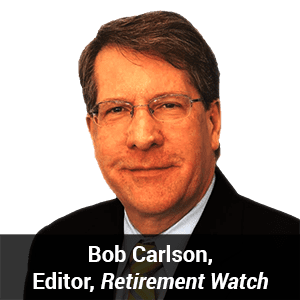Brought to you by Eagle Financial Publications | | Making the Best Use of Home Equity in Retirement, Part II | | | SPONSORED  There's been a lot of buzz surrounding A.I. over the past couple of years – but there's only ONE story you should be worried about.
Whether you have $500 or $500,000, this radical new A.I. Innovation will have a direct impact on your wealth.
Click here to learn more. CLICK HERE... | | | Fellow Investor,
 In last week's edition of Retirement Watch Weekly, I shared some tips on how to put your home to work for you before and during retirement. Today, we'll complete the list… In last week's edition of Retirement Watch Weekly, I shared some tips on how to put your home to work for you before and during retirement. Today, we'll complete the list…
Another strategy to consider for your retirement plan – and it's one that is often very misunderstood – is a reverse mortgage.
Also known as a home equity conversion mortgage (HECM) it's a loan that is backed by the equity in your home. You don't make loan repayments during your lifetime.
The loan is paid from the sale proceeds after the home no longer is your primary residence.
If you live a long time and the interest compounds to a large number, you won't owe more than the equity in your home. The lender or the federal government will take the loss.
You can take the HECM / reverse mortgage as a lump sum, line of credit, or an annuity.
For example, you can arrange for a monthly annuity that will last as long as you live.
You still have to pay taxes and insurance on the home, and you'll be responsible for maintaining it. But you receive part of your home equity in cash without having to move.
The major disadvantage of a reverse mortgage is that it is a relatively expensive way to borrow. Because of the costs, you'll be able to borrow much less than the full equity of your home.
The percentage of the home's value you can borrow will depend on your age and the level of interest rates when you borrow.
Here are the key points when planning how to use these reverse mortgage strategies to benefit from your home equity.
Downsizing is best done sooner rather than later..
There are social and emotional aspects to leaving a long-time home, so the longer you wait the more difficult the move and subsequent readjustment will be.
Age, of course, makes the physical act of moving more difficult. Physical limitations could make the move more expensive because you have to hire people to do things you would have done a few years earlier.
Also, the lifetime benefits of downsizing are greater when you act sooner.
The financial goals of downsizing are to increase your nest egg (resulting in higher income) and decrease monthly expenses. The sooner you make the change, the greater the lifetime financial benefits. | |  There is a way retirees can collect thousands of dollars per month for the rest of their lives -- tax-free. Plus, this tax-free income source is 100% legal and approved by the IRS.
And here's the kicker: even if they don't have enough money put away yet for retirement... even if they're over age 60... they can still get thousands of dollars a month from this opportunity. Click here to find out more. CLICK HERE... | | | Downsizing also should occur before using a reverse mortgage.
If you take out a reverse mortgage and decide to downsize later, you have to pay the reverse mortgage and all its accumulated interest and fees from the sale proceeds.
Taking out a reverse mortgage will foreclose downsizing in the future for many people.
Another thing to keep in mind: A reverse mortgage is very flexible.
Traditionally a reverse mortgage was used to pay for medical expenses or home maintenance late in life when other cash sources were exhausted or to set up an annuity to supplement Social Security and any other income. Those uses still are available.
Another option is to create a reverse mortgage line of credit.
You can use the line of credit to avoid reducing your nest egg when markets are down or unexpected major expenses arise. Then, pay down the line of credit from future investment returns.
The reverse mortgage also can be used before age 70 if you're retired, but want to maximize Social Security benefits. You can supplement nest egg withdrawals and any other income with cash from either a HECM line of credit or monthly payments for a set period of years.
If your Social Security benefits begin at 70, you can choose to repay the reverse mortgage over time or wait to have the loan paid from a future sale of the home.
I don't want to downplay the practical and emotional aspects of your home. Too many people, however, overlook the options for managing their home equity.
There are ways you can turn your largest expense into a source of extra cash flow.
The earlier you incorporate these ideas in your retirement plan and ensure you are in the right home for the long term, the more financially secure you'll be through retirement. | | To a better retirement,

Bob Carlson
Editor, Retirement Watch Weekly | | | Editor's Note: Congress is spurring on the most dangerous retirement threat of the last 50 years. I'll reveal the deadly truth behind this government move…plus the ONLY for investors to fully protect their wealth in the coming months. Click Here for the Full Story. | | | SPONSORED  Would you like a step-by-step guide to walk you through how to maximize your Options strategies? Best of all, anybody can learn how to do it.
All you need is about 1 hour to learn how you can execute this simple strategy.
Do NOT miss this opportunity to revolutionize your Options trading. CLICK HERE... | | |
Want More Retirement Advice?
Check out my website, RetirementWatch.com, where you'll find hundreds of free articles covering every aspect of retirement planning.
Popular Posts:
What Heirs Should Know About IRAs
Surprising Tax Havens
How to Make Unlimited Tax-Free Gifts
How to Avoid Inherited IRA Disasters
New to the Retirement Watch Community: SeniorResource.com
The internet is a great way for seniors to stay connected to their friends and loved ones. Additionally, it can be a wonderful place to gather new information, take lifelong learning classes, and even play games that can stimulate your brain and enhance your cognitive function. Sadly, the internet isn't free—and not everyone can afford it. If you're a low-income senior, we have great news. You can get internet access at a discount! Here are a few ways to do exactly that. | | About Bob Carlson:
 Robert C. Carlson is the author of the books The New Rules of Retirement and Retirement Tax Guide, editor and investment director of the popular retirement newsletter, Retirement Watch, and editor of the free weekly e-letter, Retirement Watch Weekly. Bob is a frequent speaker at investment conferences around the country, and you can also hear Bob as a featured guest on nationally-syndicated radio shows, such as The Retirement Hour, Dateline Washington, Family News in Focus, The Michael Reagan Show, Money Matters and The Stock Doctor. Robert C. Carlson is the author of the books The New Rules of Retirement and Retirement Tax Guide, editor and investment director of the popular retirement newsletter, Retirement Watch, and editor of the free weekly e-letter, Retirement Watch Weekly. Bob is a frequent speaker at investment conferences around the country, and you can also hear Bob as a featured guest on nationally-syndicated radio shows, such as The Retirement Hour, Dateline Washington, Family News in Focus, The Michael Reagan Show, Money Matters and The Stock Doctor. | | | | | |
Tidak ada komentar:
Posting Komentar